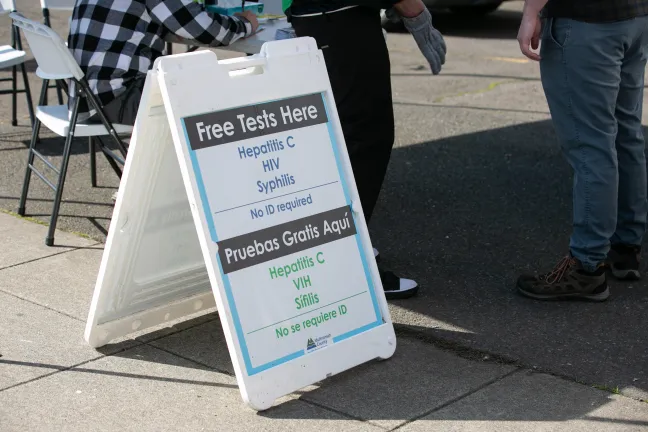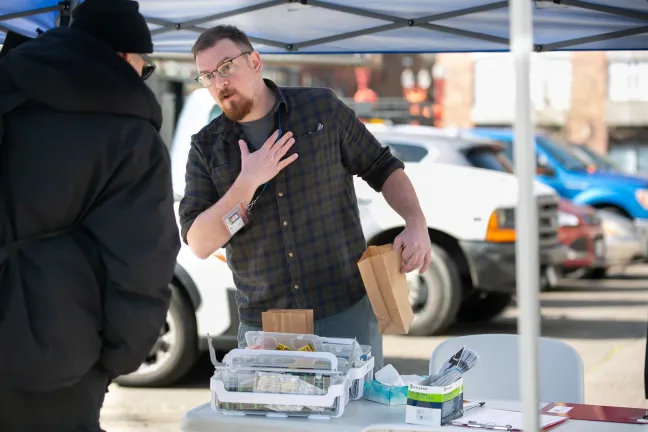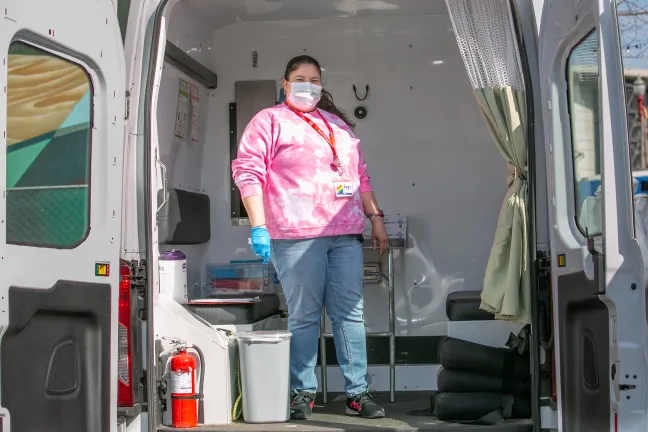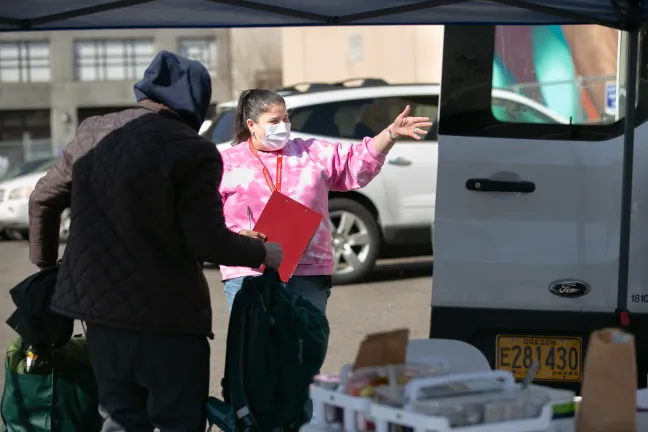On the first sunny Thursday of 2023, Chris Hamel and Marsha Brumbaugh of Multnomah County’s Disease Intervention Specialist (DIS) team stood next to an unmarked white van underneath a blue tent in the Blanchet House parking lot, located in Portland’s Old Town neighborhood. A passerby asked what they were offering. Hamel responded without missing a beat.
“Free hepatitis C, HIV and syphilis tests. Can I interest you in a cup of coffee and a test?”
The client sat down on a plastic chair and began to fill out paperwork while Hamel boiled water to make instant coffee. Brumbaugh took the client to the back of the van to draw their blood. Meanwhile, another person stopped to ask for some condoms and naloxone, and a third person asked for some socks. Hamel fulfilled all these requests.
“We are not here to judge people,” Brumbaugh said. “We are here to treat clients as humans and with respect, regardless of their circumstances. We provide supplies and information for people if they want help making decisions for their health. A lot of times, people just want to talk. So I listen to them.”
The person Hamel convinced to get tested exited the van with a smile on their face, laughing at a joke Brumbaugh had just made.
“I’d give them a 10 out of 10 for customer service,” they said as they took a sip from their coffee. “People like me, we live in this neighborhood and we need these services. It’s great they [Multnomah County] come to us because it’s hard to leave all my stuff and get into a clinic to get tested.”
Test results are available a few days after the blood draw and can be accessed via text, email or in-person. The client accepted a hygiene packet that Hamel offered.
“Sometimes all it takes is a cup of coffee,” Hamel said. “Some people come here all business-like, and know what test they need. Others need to be held sometimes, and a cup of coffee or a snack can be enough to help open someone’s eyes to a small change they can make in their life at that moment.”
“I really believe it works.”
A rise in syphilis cases
Hamel described how crucial it was for the DIS team to establish a consistent presence, which is why they now set up their mobile testing clinic every Thursday from 11 a.m. to 1 p.m. outside the Blanchet House.
“Some people don’t have a phone, or have a phone that partially works, and they will come back next week to find their test results,” he said.
The County’s DIS team started offering free tests at the mobile site in December 2019. The COVID-19 pandemic forced the testing site to close for one year. However, the team restarted in March 2021 and has been providing weekly tests to the community ever since.
Twenty-five years ago, syphilis was not on public health officials’ radars. The curable illness, which is treated with penicillin, seemed to be a bygone issue that no longer required extensive intervention to manage.
Brumbaugh explained that many of her patients do not even know what syphilis is due to a lack of education.
“Many people, even providers, have told me they thought syphilis was eradicated,” she said. “There’s just not enough information.”
Since 2001, health officials in Multnomah County and the rest of the country have seen a steady rise in syphilis cases. In 2010, the County reported 30 syphilis cases. In 2016, there were 257 cases — a 757% increase in that timeframe. In 2022, there were 817 cases, a 218% increase from six years prior. Men who have sex with men were initially the most at-risk group, so the County focused its outreach efforts in the gay and queer communities, providing culturally responsive resources on how to get tested and treated.
Before 2010, syphilis cases in females were rare. In 2013, females made up only 7% of total syphilis cases. However, by 2022, that figure had risen to 23% of total cases.
With the rise in female cases came a rise in congenital syphilis (CS), which occurs when a pregnant person with syphilis passes the infection to their baby during pregnancy. Over the past 10 years, officials have seen a worrying increase in syphilis among pregnant individuals, alongside an overall increase of syphilis among networks of people who inject drugs or use methamphetamines. Some who were diagnosed in these networks were also experiencing housing instability. Untreated syphilis in fetuses can cause stillbirths and lifelong health problems.
The lack of information, awareness and testing Hamel explained, is now opening up the risks and harms of syphilis especially to young, heterosexual women who use drugs and have been told that syphilis was not anything they needed to worry about.
“Public health is expected to respond to certain illnesses in specific communities, so we follow a culturally responsive practice," he said. "When the impacted community changes, we are set on a new path and need to reconsider who we work with.”
If a person tests positive for syphilis but they have had a negative test in the past year, they only need one penicillin shot to be cured. However, many women, regardless of their housing situation, do not have a history of syphilis tests since the test has not been a regular part of typical women’s health screenings; other barriers that make healthcare less accessible also keep women from regular syphilis tests.
The protocol for someone who tests positive and does not have a negative test from the past 12 months takes a cautious approach: three penicillin shots, with each shot separated by a week.
Brumbaugh said she sees many people, some even in their 50s, who have never been tested for syphilis. “Testing is important because syphilis symptoms can present in different forms, or never even show in the patient at all.”
The Oregon Health Authority recommends that all adults under age 45 be screened for syphilis at least once if they have not been screened since Jan. 1, 2021, and at least every 12 months if there are indications for more intensive screening. More information on sexually transmitted infection screening recommendations can be found here.
Between 2010 and 2022, Multnomah County recorded 41 cases of congenital syphilis, resulting in the deaths of at least six infants. The devastating fact is that CS is a preventable disease. If a pregnant person completes their penicillin treatment 30 days before they give birth, the baby is not at risk.
Over the past two years in Oregon, one-third of syphilis cases in pregnant people were first detected at the time of delivery, which means the mother didn’t even have a chance to receive treatment that could reduce long-term fetal development problems.
Shift in response
Pregnant people who test positive for syphilis but do not have permanent addresses or reliable phones may struggle to complete their penicillin treatment. If a person gets a test but the County cannot contact them to provide the results, the person will not know they need treatment. Those who carry their belongings with them may face difficulty accessing a clinic, even one with low barriers to entry. Even individuals who complete treatment could in some cases become reinfected by a partner who is positive. These considerations led the DIS team to increase their outreach efforts to the community of people experiencing homelessness.
“It wasn’t until we noticed a shift in the population getting infected that our approach started to change, and our field work really began to increase,” said Hamell.
Multnomah County’s sexually transmitted infection outreach programs have been around since the 1970s. But in 2017, the DIS team — recognizing that many people who were testing positive may not have phones or fixed addresses — decided they could no longer rely on the usual networks to find people who might be testing positive and set out to find innovative ways to reach them.
Along with their work in gay and queer spaces, the DIS team increased access to tests and treatment in homeless camps, bringing testing to where people at greater risk of syphilis lived instead of requiring them to come to a clinic. Many people who test positive might have trouble getting to a clinic appointment, or have had poor experiences in healthcare where they felt judged or mistreated.
Between 2021 and 2022, 60% of the babies born with CS were born to someone who was unstably housed; 60% of babies born with CS were birthed by someone who struggled with substance use.
Pregnant people who use drugs often will face immense judgment and stigma when they go into a medical space. For these individuals to get treatment may require them to confront others' judgment. And many people are not willing to take that risk. Hamel explained the County partially started offering treatment in the community due to the increase in pregnant people not seeking treatment because they were afraid their baby would be taken away from them.
“Pregnant people with substance use experience stigma, fear, shame and barriers to care,” said David Cuevas, DIS program supervisor. “They isolate themselves from others, skipping treatment or avoiding treatment altogether to avoid having to experience discrimination and fear of punishment.”
Treatment and testing the community in the community
Multnomah County has responded to the rise in syphilis by having six tenacious and creative staff members who go above and beyond when it comes to working with impacted communities.
“Our staff just doesn’t give up,” Hamel said. “We make a pledge with patients that we will go and see them and help them get to an appointment. And we don’t like to break promises we make.”
The DIS team might connect with clients through social media. They establish relationships with people in homeless camps by offering health kits and coupons for free tests. The team incentivizes patients with gift cards to come back to future appointments and to bring in their sexual partners to get tested as well.
Brumbaugh recently tested a man who had not been screened in a while. He had a new partner and was newly houseless in Oregon. “We finished the testing and luckily we can get rapid syphilis results within the same day,” Brumbaugh said.
The man’s test results came back positive, so Brumbaugh went with her co-worker to a heavily tented area where the man said he could be found. They asked around but could not find the man to deliver his results. Brumbaugh would later connect with the man a few days later.
“We got him connected to care and he’s doing okay.”
Teams, such as Brumbaugh and her co-worker, go in pairs on foot with supply backpacks, knocking on tents in search of a person they think has syphilis. Jaxon Mitchell, Multnomah County’s harm reduction prevention and intervention manager, described how he and a teammate looked for a woman based on a photo of her and a pit bull.
“When we arrived in the general area where we thought this woman was living, no one knew where she was,” Mitchell said. “We had almost given up when we saw that same pit bull from the photo. The dog led us to find the woman.”
In some cases, the County provides temporary housing in a hotel while a patient completes their treatment. Other times, a nurse and outreach worker will meet the patient where they are living and accompany them to their appointment to receive treatment. When treatment in a clinical setting is a barrier, outreach workers have found sometimes the only way for a pregnant person to receive treatment is in the setting of where they live.
“I treated a pregnant woman for syphilis at her tent under a bridge in North Portland,” said Sara Porter, a nurse practitioner and lead clinician with the STD/HIV/hepatitis C and harm reduction programs. The young woman already had several children in foster care and she was convinced that if she did not go in to get prenatal care, she would be able to keep her baby.
Porter was able to treat the patient early enough so her baby was not born with CS.
“We have dedicated resources and personnel to responding to the rise in syphilis because this is a priority for the County and worth the resources,” said Kim Toevs, communicable disease and harm reduction programs director.
“To truly help impact communities, these staff can’t only sit behind a desk and answer a phone.”
A snowball effect of building awareness
As Hamel prepared a hygiene kit for another client, he reflected on how far the County has come to responding to the rise of syphilis in a new population. One major area he believes is improving is recognition of the disease among women’s health clinicians.
“More women are understanding, in part because their clinicians are more aware,” Hamel said. “While this has been a slow change to implement, a snowball effect is taking place and awareness is growing. More women are being tested in healthcare settings than before we started this work in 2015. That to me is a win.”
As Hamel and Brumbaugh began to pack up their equipment for the day, passerby continued to ask questions about the services.
Brumbaugh put on clean gloves and took out her paperwork. Hamel added more water to the kettle and caught the eye of an onlooker.
“Can I interest you in a cup of coffee and a free syphilis test?”





